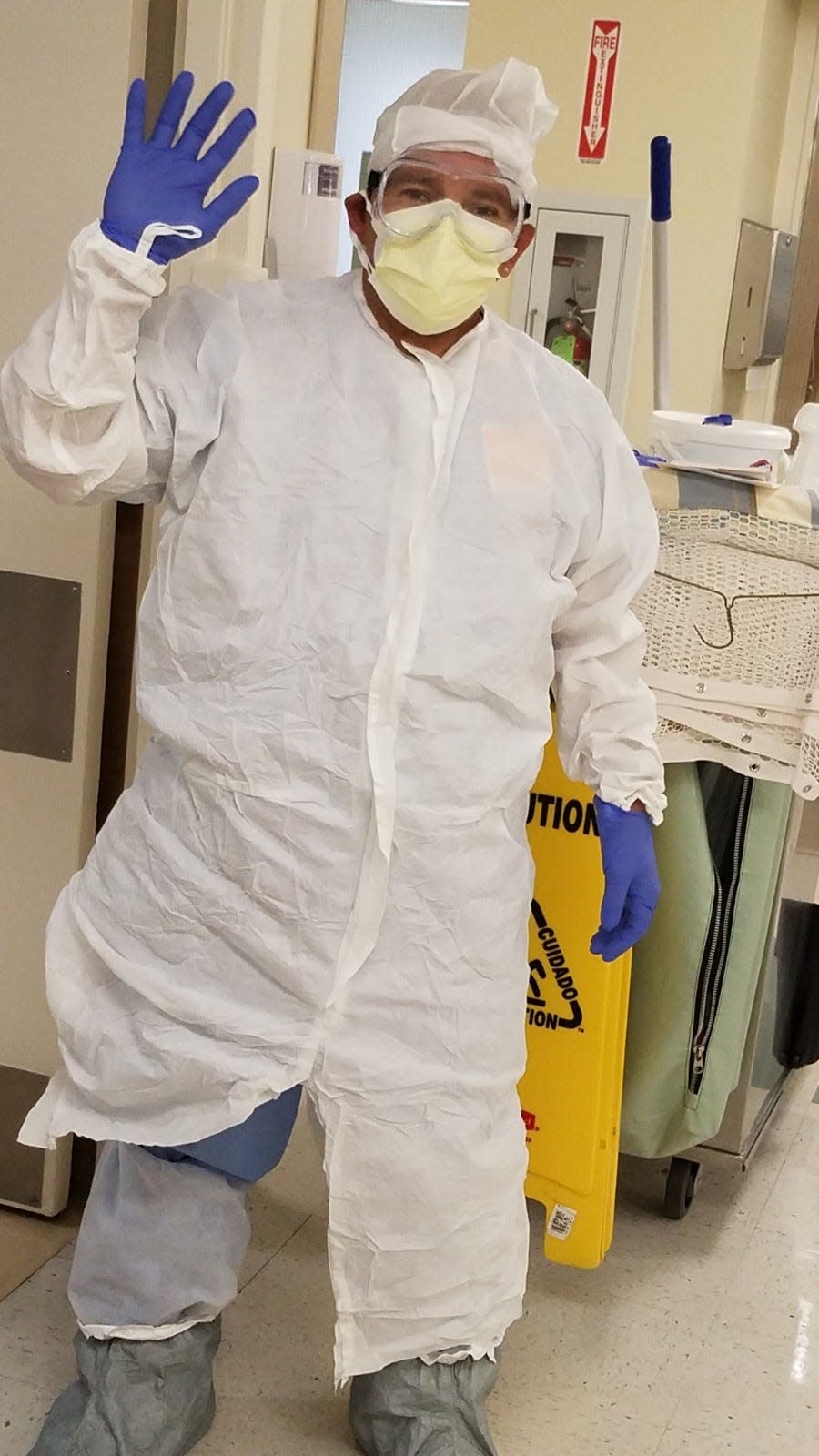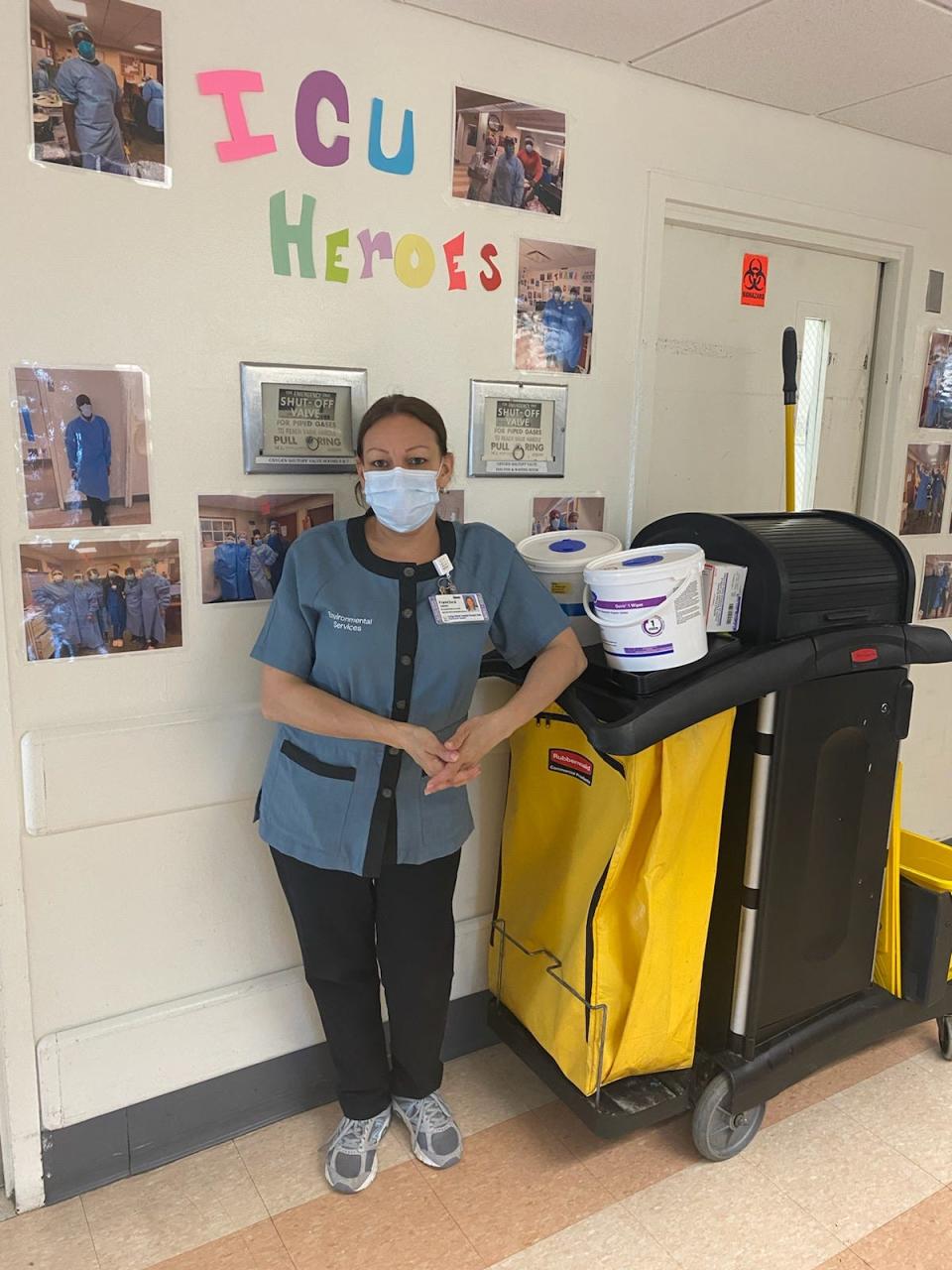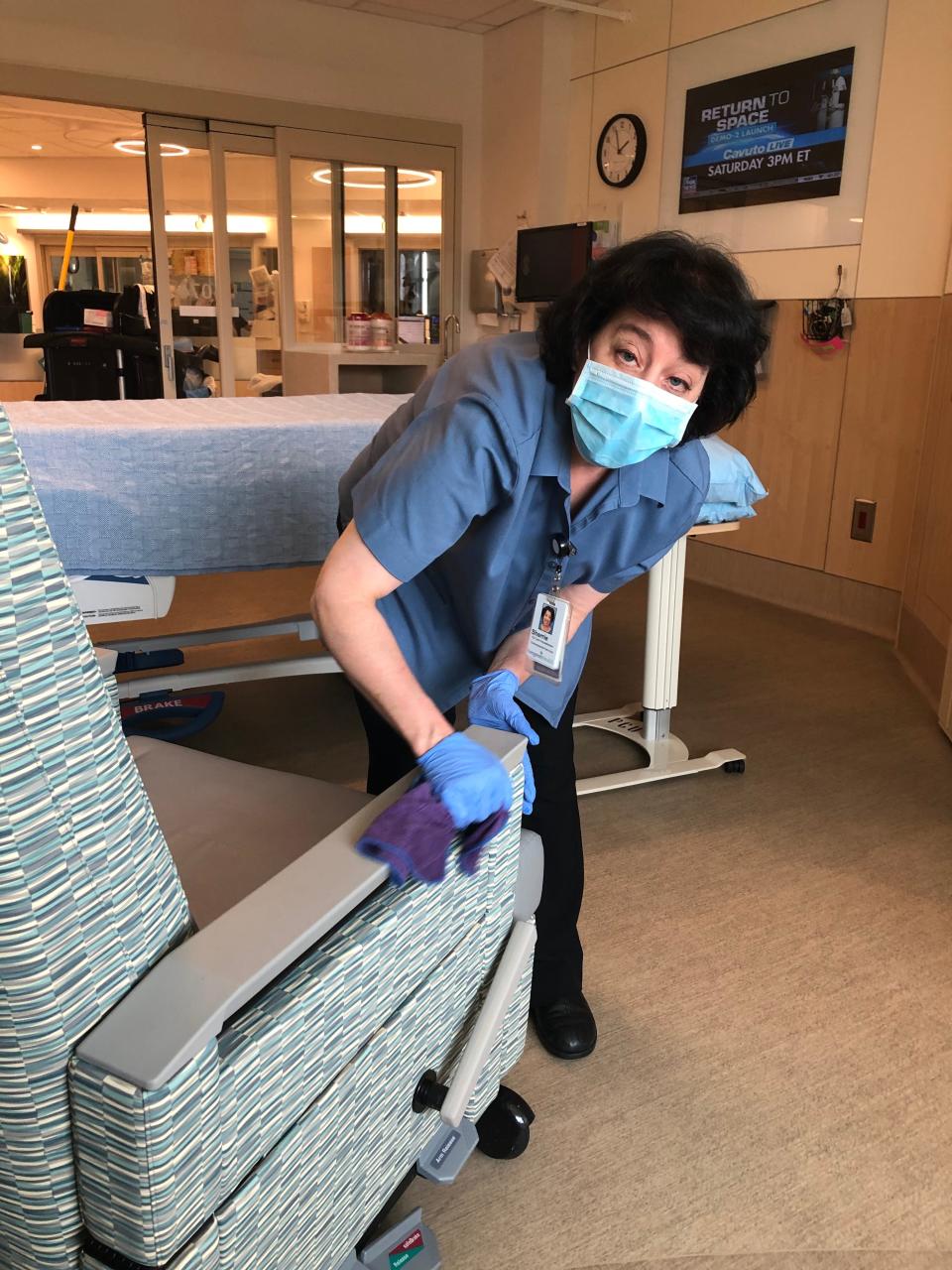'We're heroes, too:' Hospital janitors risk lives to stop spread of COVID-19
Luis Padilla, 46, stood in line at McDonald’s, excited to order his free meal. Earlier that week, the chain announced it would give thank you meals to front-line workers battling the coronavirus.
Padilla, who has spent the last three years as an environmental service tech at Los Angeles County-USC Medical Center – the technical term for a hospital custodian – was thrilled his work was being acknowledged. Then he got to the register.
The cashier glanced at Padilla’s work badge and waved him away. “This is not for you,” Padilla recalls the cashier saying. “This is for doctors, nurses, and police. Don’t be trying to get free food.”
Padilla was crushed.
“No one is thinking about custodians at all,” he said as he recounted the incident. “People have no idea what we do. We’re not just picking up trash.”
Across the country, as millions open their doors and windows every night to cheer doctors and nurses battling a deadly pandemic, people like Padilla operate in the shadows. They work the same 12-hour shifts, using special training to ensure hospitals stay clean, but for considerably less pay and sometimes without the same protective gear given to doctors and nurses.
Environmental service workers “are such an integral part of the whole health care team,” said Jane Hopkins, executive vice president of Service Employees International Union's Northwest chapter. “In a hospital, they’re just as important as a doctor – they’re just doing a completely different job.”

The union represents about 32,000 nurses, health care workers and behavioral health workers in Washington state. About 1,500 are environmental service workers. Many are Black or Latino, which likely contributes to these workers being overlooked, Hopkins said.
“We talk about heroes, but we don’t talk about them,” Hopkins said. "Decades of institutionalized racism and socially acceptable racism has made it seem like their jobs are not important.”
Language is often a barrier for environmental service workers, Hopkins said, because so many are immigrants. Unions must remind hospitals to distribute instructions and safety protocols in a multitude of languages to keep workers and patients safe, Hopkins said.
“It does not matter where you work in the hospital,” Hopkins said. “You need to be protected.”
PPE not always provided
The coronavirus has killed more than 421,000 people worldwide and more than 113,000 in the U.S. alone, but hospital custodians said they are not always given proper personal protective equipment.
Justo Mejia, 58, has spent 10 years as an environmental service worker at Northridge Hospital Medical Center near Los Angeles. On vacation when coronavirus first hit, Mejia returned to work in mid-March and found himself in the middle of unprecedented chaos.
Before the pandemic, he said, the routine was standard: a morning meeting to talk about the day’s plans before he left to clean whatever section of the hospital he’d been assigned. On days where he was cleaning patient rooms in the respiratory unit, he would be given an N95 mask and a new gown before entering each room.
When he returned to work, everything had changed.
“When I went on my vacation, there was an abundance of PPE,” Mejia said in Spanish. “When I got back, there was nothing. No masks, no gowns. I had no idea what happened.”

After a few weeks, Meija said conditions improved and he was given a regular, non-N95 mask to wear for the day. But if he requested an N95 mask, some supervisors gave him one, while others didn't.
“You’re always on the defensive,” he said. “You’re ready to fight with them if they don’t give you your PPE.”
In a statement, the Northridge Hospital Medical Center said it has "followed CDC guidelines on personal protective equipment from the beginning of this pandemic and we adapt and implement new policies to comply with their recommendations." A spokeswoman declined to address Mejia's comments directly.
Fear of passing virus to family
Even with adequate protections, there are worries.
Padilla, the environmental service tech at LAC+USC, said he’s had the same personal protective equipment as nurses and doctors since the pandemic hit. But he heard so much about asymptomatic people passing on COVID-19 that he feared giving the virus to his parents, both in their early 70s, who live with him in Los Angeles.

The first few nights he worked during the pandemic, Padilla slept in his car, desperate to keep his parents healthy. He later transitioned to a hotel paid for by the county. He’s been there for about six weeks.
“It makes me feel so much safer,” he said. “My family actually didn’t want me to come back to work; they wanted me to quit. But that’s not who I am.”
Padilla finds his job stimulating. He terrifies and delights his three boys, ages 15 to 28, with stories of what he has to clean up after surgeries – the usual mix of blood, body parts and skin.
Like many environmental service workers, he’s nervous about a second, deadlier wave of cases as the country opens back up. If that happens, he hopes people will understand the critical role he and his colleagues play in keeping America safe.
“We’re heroes too,” he said. “We’d like to have some recognition also.”
He paused and laughed softly. “And we’d love to get hazard pay.”
'I tell them, 'I am here to help you"'
Many hospital custodians point to their interactions with frail patients as evidence that they are making an important contribution.
Francesca Cepeda, 52, has spent the last 14 years as an environmental service worker at Long Island Jewish Forest Hills, a hospital in Queens, New York. Thirty years ago, she emigrated from the Dominican Republic.
Patients who don’t speak English well or at all are often comforted when an environmental service worker who looks like them enters the room, Cepeda said. Sometimes she acts as a translator; other times she simply provides a friendly face and an opportunity to converse in their native Spanish.
“As soon as I go in the room, they calm down. I love it. I tell them, ‘I am here to help you,'" said Cepeda, who works in the ICU.

Cepeda has seen so many tributes to doctors and nurses, she’s lost count. But she hasn’t lost the belief that they're not the only ones who matter.
“At some point,” she said, “we’re all taking care of the patients.”
In Kirkland, Washington, where the nation's first coronavirus outbreak was reported at a local nursing home, patients were hospitalized at EvergreenHealth, where Warren Juvle, an environmental service day shift supervisor, has worked since 2013. When the first coronavirus patients arrived, along with stories of how contagious and deadly the virus was, Juvle knew he had to set an example for the 28 employees he oversees.
“All the housekeepers, they had fear about going into those rooms,” Juvle said. ”Since I’m the leader, I had to show them what needs to be done – so I went in the rooms with them, showing them what to do, to support them and boost morale. If they have the guts to do it, why wouldn’t I?”
Juvle made a point to chat with every COVID-19 patient whose room he visited and encouraged his staff to do the same. He didn’t want anyone to feel unwelcome, especially as they suffered through treatment without visitors.
Juvle was worried about catching the virus and passing it on to his wife, who is six months pregnant with a baby girl, or his parents, who are 79 and live with him. He considered staying home from work. But he decided he needed to be in the hospital.
"They need people like us to do the job, to keep everyone safe," he said.
Since Feb. 28, EvergreenHealth Kirkland has had 459 confirmed cases of coronavirus, and 73 of their roughly 5,000 employees have tested positive, though only 632 have been tested. (EvergreenHealth could not say if any of the positive employees were environmental service workers.)
Juvle said he feels safe because he’s always had the proper protective equipment. The employees who report to him feel the same.
Sherrie Kendall, 55, has worked at EvergreenHealth for about 18 months after a prior career as a preschool teacher. Coronavirus has been scary, she said, but she feels safer at work, where she has personal protective equipment and knows she's in a sterilized environment.
The job is emotionally and mentally taxing, she said, especially when you’re surrounded by so much death. Amid the fear, she finds joy in knowing she has a purpose.

“So many people are feeling helpless during this pandemic,” she said. “But I’ve felt like I was making a difference and contributing from the start. That’s very satisfying, to feel like you’re doing some good in the world right now.”
Contributing: Alan Gomez
This article originally appeared on USA TODAY: Essential workers include hospital custodians, though often forgotten

